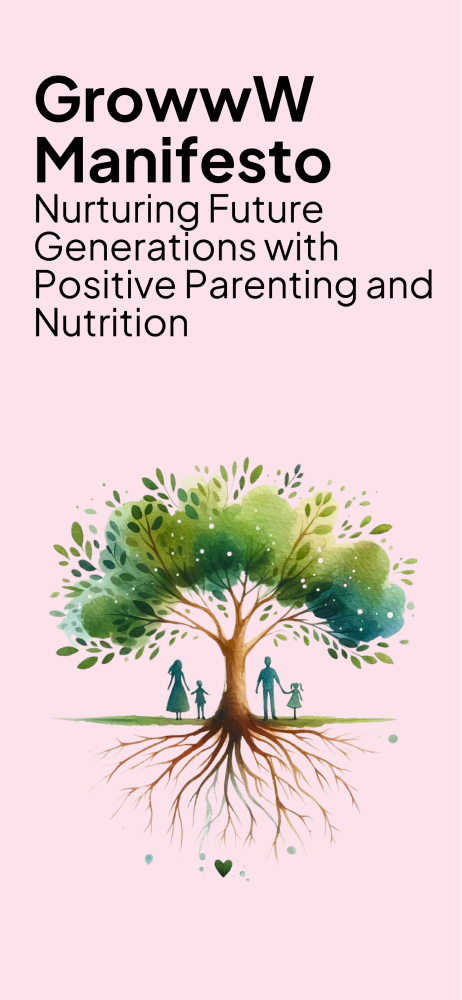
The GrowwW Way: Nurturing Future Generations with Positive Parenting and Nutrition
At GrowwW, our commitment to nurturing the holistic development of children goes beyond just emotional and intellectual growth. We embrace the Positive Parenting Framework as our guiding philosophy. As a well-researched approach and method with over three decades of proven effectiveness the PPF serves GrowwW as a practical guide and theoretical backbone blending insights and research among others from social learning models, child and family behavior, social information processing and developmental psychopathology . Our approach intertwines parenting styles with a comprehensive lifestyle that fosters both mind and body wellness.
GrowwW Core Principles
- Positive Reinforcement and Nutritional Choices: Celebrating children’s achievements extends to their dietary habits. Acknowledging their healthy food choices fosters a positive relationship with nutrition mindful eating.
- Effective Communication in Nutritional Understanding: We believe in the power of open dialogue about food and nutrition. This encourages children to understand and embrace the importance of a balanced diet in an engaging and age-appropriate way.
- Empathy in Dietary Preferences: Understanding children’s food preferences is key. Our approach empathizes with their choices and concerns, offering guidance instead of criticism.
- Consistency in Nutritional Boundaries: Setting clear guidelines about nutrition, including balanced meals and responsible eating habits, provides children with a structured approach to food, essential for fostering responsible eating habits.
- Role Modeling in Healthy Eating: Parents, as role models in behavior, extend this to their dietary habits. Showcasing a variety of healthy eating patterns instills similar values in children.
- Encouraging Independence through Nutrition: Involving children in meal planning and preparation empowers them to make informed dietary choices, fostering independence and decision-making skills in nutrition
- Problem-Solving in Dietary Challenges: Addressing eating issues constructively, focusing on collaborative problem-solving, and identifying underlying causes, aligns with teaching resilience and adaptability, key traits for handling dietary decisions.
Building Future Traits: From Nutritional Habits to Life Skills
When the GrowwW Core principles are consistently applied, especially in the context of nutrition, they lead to the development of specific, desirable characteristics in children. These traits reflect a harmonious blend of emotional intelligence, physical health, and social skills, all nurtured through a thoughtful approach to parenting and dietary habits. They can be summarized as follows:
- Resilience and Confidence through Nutrition: By making informed and healthy dietary choices, children not only nourish their bodies but also build a strong sense of self-confidence. This knowledge empowers them to face life’s challenges with resilience, knowing they are making choices that benefit their health and well-being.
- Empathy and Emotional Intelligence in Eating Habits: Understanding the role of nutrition in overall health fosters empathy and emotional intelligence. Children learn to care for their own nutritional needs and develop a compassionate understanding of others‘ dietary choices and restrictions.
- Communication Skills and Dietary Choices: When children articulate their nutritional preferences and understand the reasons behind them, it enhances their communication skills. This ability to express and discuss healthy choices is a crucial step in developing assertive and informed individuals.
- Discipline and Responsibility in Eating: Learning about the importance of balanced nutrition helps children develop a disciplined approach to eating. They become more responsible for their dietary choices, understanding the long-term impact of these decisions on their health.
- Independence and Informed Decisions in Nutrition: Involvement in meal planning and understanding nutritional concepts encourages children to think independently and make informed decisions. This autonomy in choosing what they eat fosters a sense of ownership and pride in their dietary habits.
- Problem-Solving in Nutritional Contexts: Dealing with nutritional challenges, such as making healthy choices in different scenarios, equips children with problem-solving skills. They learn to navigate dietary decisions thoughtfully, applying critical thinking to their food choices.
- Ethical and Moral Values in Food Choices: Embracing healthy eating habits as part of a lifestyle choice reflects the ethical and moral values instilled by parents. This alignment shows their respectful and mindful approach to food and health.
Cultivating a Balanced and Fulfilling Future
Join us at GrowwW in this holistic journey of parenting and child development. By integrating emotional intelligence with nutritional wisdom, we guide our children toward becoming resilient, empathetic, and value-driven individuals. Our approach is not just about nurturing the mind but also the body, setting the stage for a healthier, happier future. Let’s empower our children to lead balanced and fulfilling lives.

